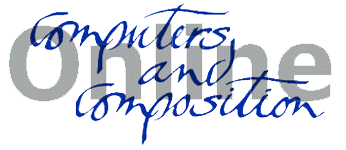Spring 2010 - Editor's Welcome
Our Spring 2010 issue presents a fabulous array of webtexts that bridge the gap between issues central to composition studies—plagiarism, invention, assessment, and the teaching of argumentation—and the new media contexts in which such issues play out in the 21st-century writing classroom, including blogs, SecondLife, and YouTube. To that end, Theory into Practice begins with Lanette Cadle's "Fighting the Fear: Plagiarism and Technophobia," a visually and textually creative piece that analyzes the exaggerated fears of academic dishonesty in digital spaces and the types of pedagogical and administrative decisions that reinscribe metaphors of fear. Christine Denecker’s "Digital Heuristics: By Chance and By Choice" provides a strong model of teacher-research in online spaces, chronicling the implementation of a multimodal invention activity that unexpectedly meshed with published research about the multimodal composing process. Closely related to discussions of multimodal composing is David M. Rieder’s "Snowballs and Other Numerate Acts of Textuality: Exploring the "Alphanumeric" Dimensions of (Visual) Rhetoric and Writing with ActionScript 3," a powerful argument for “how writers can combine numerate and literate methods of writing in order to discover new, hybrid forms of textuality as well as new methods of writerly invention.” Finally, to remind us of our continued need to pay attention to the larger sociopolitical discourses that govern our use of technology in the classroom, Katherine Wills’ "Still Paying Attention Ten Years Later: A Bakhtinian Reading of the National Information Infrastructure Initiative Agenda for Action" asks computers and composition specialists “to consider the implications of public policy on their work and [on] critical technological literacy as they near the close of the first decade of the twenty-first century.”
The Virtual Classroom progressively builds a strong argument for the use of digital tools in a range of academic and professional writing contexts, beginning with Geoffrey Middlebrook's "Educational Blogging: A Forum for Developing Disciplinary and Professional Identity," which calls for the use of blogs as professional development tools for undergraduates in advanced writing courses designed to prepare students for success in their careers. Jeannie Parker Beard’s "Documenting Arguments, Proposing Change: Reflections on Student-Produced Proposal Documentaries," reflects on the successes and challenges of implementing digital video projects in the first-year writing classroom over several semesters, addressing the logistical dilemmas of putting the theory of multimodal composition into practice. Dirk Remley’s "SecondLife Literacies: Critiquing Writing Technologies of SecondLife" profiles similar innovation in documenting the ways in which SecondLife enables multimodal collaboration in the form of a sophisticated student-produced video that recognizes the affordances and constraints of SecondLife within business and organizational contexts. Rounding out these discussions is Elizabeth Murray’s, Hailey Sheet’s, and Nicole Williams’ "The New Work of Assessment: Evaluating Multimodal Compositions," which uses results of survey research to advocate for assessment rubrics to assist teachers new to the digital composing process.
Our Professional Development section features our very own Meredith Graupner’s "Blogging a Scholarly Identity," a call to current and future faculty to experiment with the role of blogs in blending our personal and professional lives and to consider how our scholarly identities evolve in digital spaces. And finally, our Reviews section includes Kerri Hauman’s review of Collin Brooke’s Lingua Fracta: Toward a Rhetoric of New Media; Luke Rodesiler’s review of William Kist’s The Socially Networked Classroom; Alison Witte’s review of Dànielle DeVoss, Heidi McKee, and Richard Selfe’s Technological Ecologies and Sustainability; and Jeff Kirchoff’s review of Matt Barton and Robert Cumming’s Wiki Writing: Collaborative Learning in the College Classroom.
As I approach my eighth year as Editor of Computers and Composition Online, I realize how important this role, and the many collaborations that have resulted from it, has been to my professional identity. I remain grateful to the mentorship of Computers and Composition Editors Gail Hawisher and Cindy Selfe and am equally indebted to our talented graduate-student editorial team here at Bowling Green.


